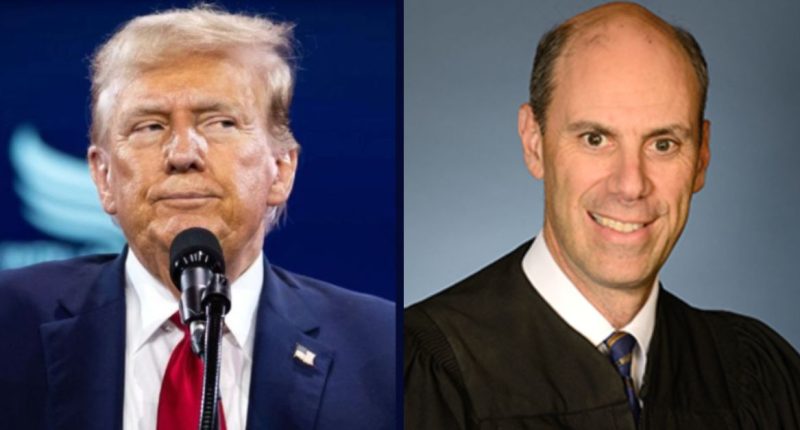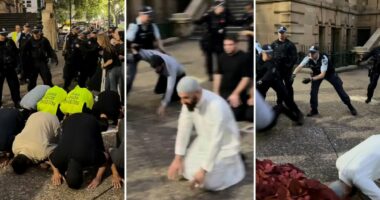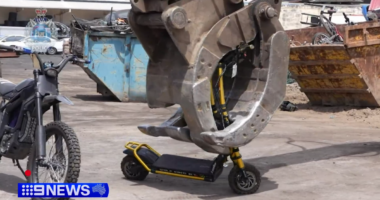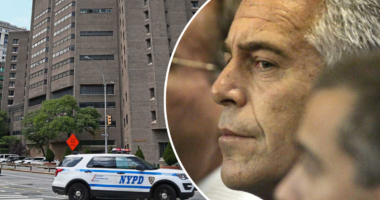Share this @internewscast.com
Left: Donald Trump addressing the annual Road to Majority conference in Washington, DC, June 2024 (Allison Bailey/NurPhoto via AP). Right: U.S. District Judge James Boasberg (U.S. District Court for the District of Columbia).
A day filled with evasion and frustration unfolded in a Washington, D.C., courtroom as a federal judge posed challenging questions to the government, which seemed intent on sidestepping them.
In a hearing that lasted an hour, U.S. District Judge James Boasberg pressed an attorney from the U.S. Department of Justice on public declarations made by officials from the Trump administration concerning various matters related to the original Alien Enemies Act (AEA) case.
At one point, the judge referred to the companion case of admittedly “wrongfully deported” Kilmar Armando Abrego Garcia, noting parallel issues and pushing the DOJ to account for President Donald Trump’s recent statements about the 29-year-old father sent to a notorious prison in El Salvador, in violation of two court orders.
Last week, the 45th and 47th president, in response to a question from ABC News, admitted he “could” just pick up the phone and have the Salvadoran president return Abrego Garcia to the United States. But, Trump added, “we have lawyers that don’t want to do this.”
Love true crime? Sign up for our newsletter, The Law&Crime Docket, to get the latest real-life crime stories delivered right to your inbox.
“Is the president not telling the truth, or could he secure the release of Mr. Abrego Garcia?” Boasberg asked Deputy Associate Attorney General Abhishek Kambli on Wednesday evening.
The DOJ attorney tried his best to sidestep the question by launching into a broader argument. But he was quickly brought back on track by the judge, who interjected to say he wanted his questions answered first.
“That goes toward the president’s belief about the influence that he has,” Kambli replied.
The actual issue at stake during this exchange was whether or not the U.S. government has so-called “constructive custody” over the immigrants currently detained in the Terrorism Confinement Center (CECOT).
“Those aliens are in the custody of a foreign nation pursuant to its laws,” the government argued in a recent motion. “The United States does not have custody so there is no jurisdiction.”
Kambli aimed to hew closely to the government’s arguments during the motions hearing, but Boasberg came prepared to nettle.
“What about Secretary Noem saying CECOT is ‘one of the tools in our tool kit that we will use if you commit crimes against the American people,”” the judge asked the government’s lawyer — quoting verbatim a triumphal statement by Department of Homeland Security Secretary Kristi Noem after a tour of the controversial lockup in March.
The government lawyer again tried to shrug off the question by saying that “sometimes” public statements by government officials “lack nuance” necessary to formal legal arguments.
The judge was not impressed.
“Is that another way of saying a number of these statements just aren’t true?” Boasberg pushed back.
Kambli insisted he was saying nothing of the sort.
The judge moved on to other factors — but signaled an obvious inclination toward finding the U.S. does have constructive custody over the relevant Venezuelan nationals detained in CECOT.
“Is the United States paying the government of El Salvador to detain the migrants?” Boasberg pointedly asked.
To which the government’s lawyer replied: “There is no agreement or arrangement whereby the United States maintains any agency or control over these prisoners.”
Clearly feeling his question was, again, not really answered, the judge pushed back to note the existence of a $4.76 million grant to law enforcement in El Salvador that provides for housing the detainees.
That grant “could be used” for those purposes, the government’s lawyer said. He maintained, however, that the detainees are legally being held under the auspices of Salvadoran law.
“The idea is there is some immediacy,” Kambli argued at one point. “None of the cases the plaintiffs cited involved asking a foreign sovereign.”
At one point, the judge put a point on his questions.
“Currently, what’s the difference between [the other detainees in El Salvador] and Abrego Garcia?” Boasberg asked.
The judge and the DOJ went back and forth on this point for a while. Kambli repeatedly tried to argue that the different court cases elided the factual question of any potential similarities. Boasberg didn’t appear to buy that and suggested there is a logical implication that the other CECOT detainees are similarly situated.
The judge also veered into the basic merits of the case, again putting the DOJ lawyer into an uncomfortable position by asking whether the U.S. Supreme Court upheld Trump’s invocation of the AEA.
“I know your client believes the Supreme Court upheld the invocation of the AEA,” Boasberg wound up, then pitched: “You agree the Supreme Court never did that, correct?”
Almost audible squirming ensued. Kambli struggled to find support for Trump’s inaccurate claim that the nation’s high court delivered his administration a victory on the AEA invocation. After several evasive answers, the judge read back the Supreme Court ruling.
“The Supreme Court did not decide one way or the other about the validity,” Boasberg noted.
Finally, Kambli was forced to admit: “They did not analyze that precise issue.”
All of the judge’s tough questions for the government, the judge said, were to help public understanding of “difficult issues,” but they also hit upon salient issues in the ongoing litigation.
“Assuming I find constructive custody and you’ve essentially admitted that their rights were violated, what’s the remedy?” Boasberg asked the government, allowing the question to pose itself rhetorically.
The court made a point to note that the major issue the lawsuit is trying to settle is what to do with the detainees if the court rules the AEA was improperly invoked and their rights were violated.
There, the questions were better suited for the plaintiffs’ counsel.
“They would be put back in the places they were, which is immigration proceedings,” American Civil Liberties Union attorney Lee Gelernt said. “I think it’s a nonstarter that it can go on at CECOT or El Salvador. We would need to be able to visit them.”
When pressed for the government’s position on such a hypothetical ruling, Kambli demurred, saying he would need to consult with his clients, particularly the U.S. Department of State.
But though the court phrased that outcome as hypothetical — and counseled that any ruling one way or another was far-off — the tenor and makeup of the questions, along with the judge’s frequent asides, suggested which way the judge was leaning.
On the matter of whether certain immigrants had received proper notice of pending deportation under the AEA, the judge was dismissive of what happened in some districts after the Supreme Court reminded the government that such notice was mandatory.
“If it wasn’t even 12 hours, you’re not going to stand here and say it was due process,” Boasberg said.
The court ended the hearing by issuing a lengthy scheduling order for follow-up arguments. To start things off, the court itself will issue its constructive custody order tomorrow. After that, the government and the plaintiffs will be back to motions practice.
















